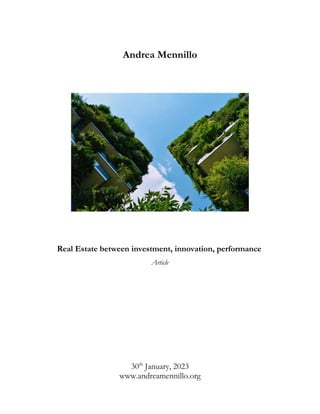
Real Estate between investment, innovation, performance
- 1. Andrea Mennillo Real Estate between investment, innovation, performance Article 30th January, 2023 www.andreamennillo.org
- 2. 2 Real estate, as the name suggests, is typically a very low-speed industry, because designing, building, renovating a house or even just completing a simple purchase or sale takes time. A slowness that affects not only the purely operational aspect related to the implementation of a construction project, but also affects the entire world that revolves around real estate, primarily the financial aspect. Making a real estate intervention, of any kind, usually requires significant capital, which must be financed. A prerequisite for any transaction in real estate is in fact the establishment of a financial plan structured according to different patterns and methods, having a necessarily multi-year duration. Whether self-financing on its own, use of private investment funds, and public/private partnership forms, the technical time required to start an operation and to have returns on investment are not insignificant. A slowness that is certainly at odds with the speed of the global world and which, perhaps even just in terms of perception, also ill matches the pace of major investors, such as private equity funds may be, who are generally accustomed to thinking and moving through markets extremely quickly to seize opportunities where they arise. Also in real estate. In recent times, however, I see that the real estate industry is also experiencing a lot of turmoil, trying to catch the innovation train in many ways. Indeed, not only new concepts of living and dwelling are taking hold, reflected in newly designed buildings and new business models, such as the growth of interest in the Build to Rent market, as opposed to the more traditional Build to Sell. We are also witnessing the green and zero-emissions renewal of construction, which will catalyze major investments in the coming years globally. And we are also seeing the entry of technology, both at the level of housing services and at the level of the market supply chain. I am referring, in particular, to blockchain technology, which is poised to enter the real estate world and for the use of which active entities are already springing up in the so-called proptech sector. Since blockchain makes it possible to ensure the security of transactions, in the real estate sphere it could, for example, improve the tracking of financial processes, greatly speed up buying and selling and smart contracts, i.e., those contracts whose execution becomes automatic upon the occurrence of certain agreed conditions. On the long wave of blockchain, we are also witnessing the new phenomenon of real estate transactions taking place directly in cryptocurrencies, instantaneously and with total security. All indications are that faster and faster ways of handling real estate transactions or simplifying complex processes through technology will find their way into our daily lives, making the industry faster, safer, more transparent and more scalable. And thus, more attractive to investors seeking opportunities in real estate and proptech. The same large-
- 3. 3 scale application of new digital tools will require a large capital commitment for dedicated infrastructure, security and expertise, opening up new strands of investment. I wonder if in the future we will come to treat buildings as a commodity. A decidedly acerbic reflection, but also very suggestive. The construction time for buildings and infrastructure, for obvious technical reasons, will not be able to be shortened much more, but for those who have dismissed the industry for its long lead times, it may be time to think again, because today Real Estate can certainly offer interesting prospects and opportunities for innovation. Andrea Mennillo Founder and Managing Director, International Development Advisory Chairman Fordham University London Centre Advisory Board
